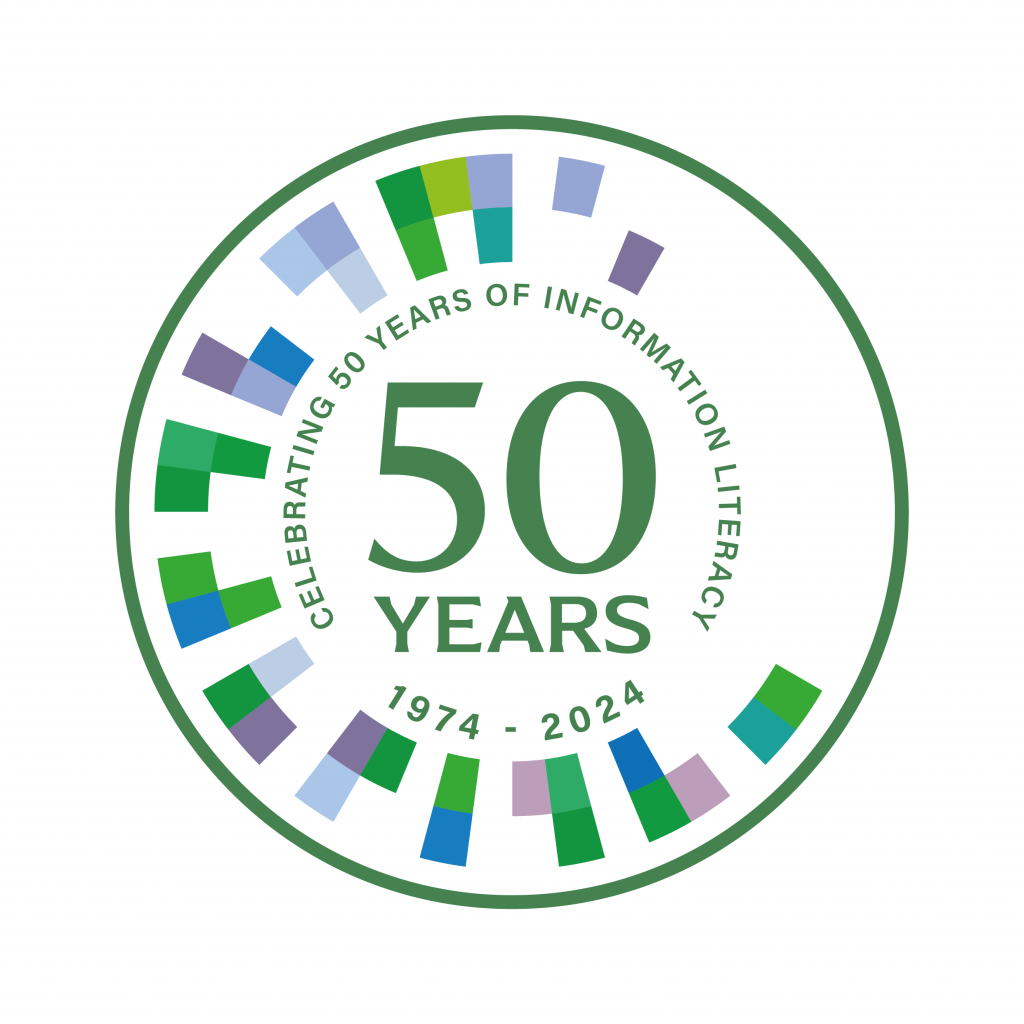In this post, Jane Secker reflects on Paul Zurkowski’s legacy in the world of Information literacy, and how we can look forward to the future.
In 1974 Paul Zurkowski the president of the American Information Industry Association coined the term ‘information literacy’ in a report he wrote entitled ‘The Information Service Environment: Services and Priorities‘. His report was focused on how the rapid growth in information, in all its forms was changing the workplace. Zurkowski made reference to an ‘overabundance of information that exceeds our capacity to evaluate it.’ He believed the population needed to be retrained to deal with this and called for a public campaign that he hoped would be complete by 1984. Of course the campaign never happened and 1984 came and went. I sometimes wonder if the world would be a different place if this initiative had taken place?
When I was at library school in the 1990s we talked about ‘information overload’ recognising then that the growing volume of information and data in the world. However, I didn’t come across the term ‘information literacy’ until I was working at LSE library in the early 2000s. A good friend, Gwyneth Price, who was a librarian at the Institute of Education talked to me about how IL differed from what I had been calling ‘information skills’. In fact when I joined LSE in 2001, the team I was part of was still called the ‘user education team.’ So much has changed in 20 years, and not just terminology. In this blog post I would like to reflect on what I’ve learnt about information literacy practice and research. It’s also timely as I have just returned from the European Conference on Information Literacy, which was held this year in Krakow, Poland. ECIL, founded in 2013, is a great opportunity to meet librarians, educators and researchers from Europe and beyond to share insights into both practice and research in IL (you can read some of Sheila Webber’s reflections on the conference on her website).
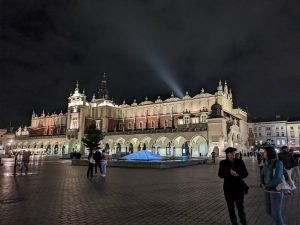
Paul Zurkowski and the “Information Literates”
But back to Zurkowski, who almost 50 years ago predicted that we could end up with two tiers of people: the ‘information literates’ who knew how to deal with the abundance of information and all the tools associated with its use and the ‘illiterates’ who did not. While he pointed out these ‘illiterates’ could read and write, they would not be able to full exploit the information environment. He believed that a relatively small percentage of the population had information literacy abilities and these were likely to be people working in medicine, government, business etc. He estimated that this might be around a 6th of the total US population. This year at ECIL many of the papers were still concerned with equipping people with information, media and digital literacies. Current researchers and librarians recognise that there is something lacking in the abilities of much of the population, whether they are students, school librarians, older adults or the wider public at large. Despite decades of research and teaching, we, the ‘information literates’ (as Zurkowski would call us) are probably still a relatively small minority of the population. But is this deficit model helpful? Many of the frameworks of information literacy have moved away from viewing it as a check list of competencies. IL researchers such as Annemaree Lloyd view IL as a social practice and something we need to understand in context, rather than seeing some people as having the skills and others as lacking.
Zurkowski predicted many of the issues associated with the proliferation of information resources in 1970s. These challenges accelerated rapidly in the 1990s with the development of the world wide web and it was the web and search engines that led to a resurgence of interest in information literacy mainly in higher education. In 1999 SCONUL developed the 7 pillars of information literacy and other models were developed around this time (ACRL, Big 6 etc). I have always enjoyed reading papers like Zurkowski’s, which seem to be a prophetic voice from the past. He was writing about what we now know is a significant problem, but one which sadly remains a concern of the few. Those of us working in universities see that it is the librarians and information professionals who champion information literacy, providing support and guidance to our staff and students and trying to embed this in our curriculums. Yet in many institutions it remains ‘invisible’ as a concept, or wrapped up in other more pressing concerns about developing digital skills or graduate attributes. What I have learnt is that IL is all these things and much more, but I think that’s what at times makes it so nebulous as a concept. Just this week when running a training session about information literacy in the workplace, one new librarian said “I recognise the issues, I just didn’t have a name for it until now.”
Where are we now?
So what have we learnt in 50 years of information literacy and what have I learnt over the past 20 years of working in this field? Here are just a few reflections from sessions I attended at last week’s conference. Firstly, I sensed that there has never been a greater urgency to develop information literacy capabilities, to help protect people from the growing tide of mis and dis-information, fake news, and the rapid developments in AI. There were a lot of papers that recognise without information literacy abilities, the foundations of democracy are threatened as people’s abilities to judge what is true becomes increasingly challenged. Michael Flierl from Ohio State University, presenting on AI, rallied us with a call for action as information professionals, to join in the debate about the ethics of AI and to regulate its use before we are swamped in a tide of misinformation created by algorithms that perpetuate online biases. It made me realise that information literacy is more critical than ever before and yet continues to be overlooked because of other priorities. Earlier this year at a workshop I was attending about AI, one senior academic felt that AI needed a new literacy and hit on this idea that perhaps it was about how to deal with information in all its forms! ‘Hmm yes I said politely, I think you’ll find that’s information literacy, and it’s been around for quite some time!’
Meanwhile in a panel session with Sheila Webber, Bill Johnson, Karen Kaufmann and Clarence Maybee we found ourselves discussing (once again) the discipline of information literacy. In some ways I was wondering if we need to go around this circle again. Surely IL is a discipline, or a sub-discipline – but I guess that is where the problem might also lie, because if we view it as a sub-discipline of Library and Information Science, in the hierarchy of disciplines LIS often sits somewhere similar to Education or Media Studies. Perhaps as one of the conference delegates said, it’s a ‘meta-discipline’ – it’s definitely a thing – attracting conferences, journals, academic papers and people who are devoting their careers to furthering its cause. I remember Sheila and Bill led a lively panel discussion on this topic at ECIL in 2014 in Dubrovnik. However, this time it feels like the foundations of the discipline are more solid and I look forward to the forthcoming Facet book on this topic coming out in 2024. Perhaps it might give greater confidence and assurances to those of us who often feel they need to explain their work using other terms, rather than information literacy (and yes I realise at times I am just as guilty of this!)
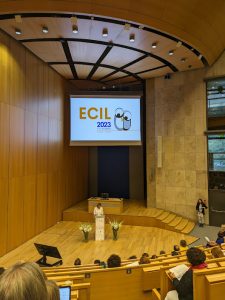
Information literacy as a global issue
I guess one important reflection I had was that IL is clearly a global issue, largely down to UNESCO’s work to recognise the importance of Media and Information Literacy. I had the fortune of attending papers from researchers and librarians in the Philippines, South Africa, Kazakhstan as well as across Europe. Mainly what these papers showed is that IL is primarily a concern for people in libraries and education and only starting to be seen as something that impacts on people’s daily lives, for example when searching for health information or trying to find employment. In my opinion we need more research and projects to link information literacy and lifelong learning in order to support the information literacy needs of the wider public. This leads me to conclude that attempts such as the initiative led by Stephane Goldstein in the UK to establish the Media and Information Literacy Alliance in the UK, are vital, to try and mainstream IL and to advocate for its importance to funders, policy makers and governments in the world. This remains a priority for the CILIP Information Literacy Group in 2024 and something I hope to devote more time to next year.
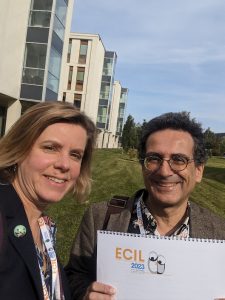
But I have also learnt that Information literacy is not going to save us from the problems of misinformation or information overload – it is one way of helping build resilience in the population and in our staff and students, but it requires action on their part. And it’s increasingly challenging for people to fact check all their sources, or work out who to trust online. A strong theme coming through the conference (as ever!) is the need for collaboration and the need for librarians to work with educators and policy makers and those in third sector organisations. Librarians need to advocate clearly about the risks of people not having these abilities, but also the need for regulation to stop the relentless tide of mis and dis-information. IL needs to start early and it needs to be something that is reinforced and supported at all stages of people’s lives. But what strikes me is that IL needs to be viewed as something positive to empower people, not as simply a way of preventing online harms.
Fifty years on, and looking forward
Fifty years of information literacy is a milestone, but it’s also a time for action and advocacy rather than resting on our laurels. The CILIP Information Literacy Group plan to spend 2024 promoting and advocating for information literacy in a year-long celebration and campaign. We are planning a series of events including webinars and in-person events. We have commissioned a special commemorative logo and have produced a limited supply of sustainable badges. We hope you can join us at LILAC this year (the 19th conference, so next year LILAC will be celebrating a big birthday too and the call for papers is out). And for those who didn’t know so am I too am reaching the half century in 2024. They say 50 is the new 40, but like information literacy, this is no time for resting on my laurels, I have big plans for my next 50 years to be at least as productive and fun as the last!
As information professionals we must try to adapt to the fast changing world. This means information literacy will need to evolve, but also as the first keynote speaker at ECIL 2023, Tim Gorichanaz, told us, we also need to be grounded in ethics and principles which should provide us with a compass for navigating both the increasingly complex information environment and our daily lives. I loved his observation that the original motto above a library was that it was a ‘house for healing the soul.’ But in particular I loved his idea that we learn morals and ethics through living, and he urged us to interview the people that we admire to find out what makes them tick. I was reminded how fortunate I am to have met Paul Zurkowski in 2013 at ECIL
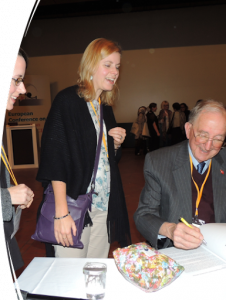
I wish he was still with us to help us with the next 50 years. We need some powerful allies and a strong message to work towards his vision of an information literate population. Perhaps we might get there by 2074? With this in mind I would really like ILG to carry out some short interviews that we can publish on this blog or release as part of our Chatting InfoLit podcast, with the champions of information literacy in our world, to share their insights into what 2024 and 50 years of IL means to them. Perhaps, through these conversations we might be able to capture insights and achieve that goal sooner? Who knows, but I do know as a historian at heart, the importance of understanding the past and where we come from before we move forward with any initiative.

